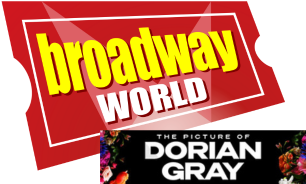BWW Exclusive Interview: Creative Music Powerhouse Scott Bradlee Shares on Developing Himself and the Sound of Postmodern Jukebox in his Book - 'OUTSIDE THE JUKEBOX'
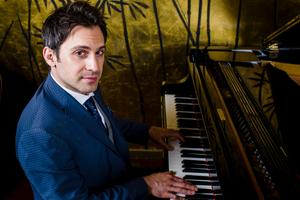
Scott Bradlee is an artist with boundless creative vision and a talented composer of the global musical phenomena, Postmodern Jukebox. His passion for creating addictive hybrids of modern music with vintage sounds for the old and new opened a floodgate of a successful career in albums, touring and popular YouTube content that draws millions of hits. The magic of PMJ is found in the caliber of talent Bradlee continues to assemble for his memorable arrangements. Hits range from 20's jazz style renditions of Radiohead's "Creep" and Lady Gaga's "Bad Romance", to New Orleans Jazz versions of "Sweet Child O' Mine", and "All About That Bass," Spotlight worthy singers have included Haley Reinhart, Mykal Kilgore, Casey Abrams, Morgan James, Vonzell Solomon and literally dozens more. Bradlee's talent has birthed an expressive blend of old and new, making something uniquely original.
Bradlee catalogs his journey as a creative kid to living his dream in his book "Outside the Jukebox: How I Turned My Vintage Music Obsession into My Dream Gig" His writing gives a candid and inspiring look into moments, conversions, and reflections in his long career growing the success of Postmodern Jukebox. We spoke over the phone in length about his book and the journey making the dream of Postmodern Jukebox into a career.
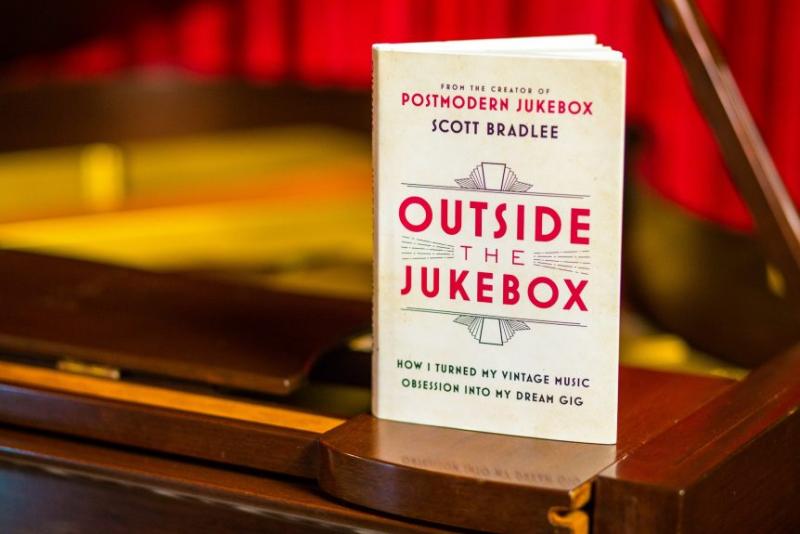
David Perry - "How was it for you sifting through so many years of memories and material?"
Scott Bradlee - "Part of my reason for writing it now as opposed to waiting to do it later is I can remember a lot of this stuff easier now. Going through old emails or looking at old pictures would jog his memory. "Nowadays we constantly obsess about documenting everything."
DP - "The stores your share have a fluidity and smoothness in the storytelling. It's not choppy. It's wonderful to read how you have brought onboard such amazingly talented artists. I found as you read further in the book you become familiar with them. Almost like they are old friends."
SB - "That was something that I wanted to capture. Working on this project has been an adventure. I rarely share any behind the scenes stuff. We are not that kind of brand who generates that kind of material. The stories I pulled from show how everybody is such a character. I wanted to tell those stories but also give people a sense of what I felt at the time, and definitely write it in a more casual and conversational style. I feel that is the best way to go through a story and capture our personalities."
DP - "Building a trust with so many artists is no easy task. You say in the book "I wasn't supposed to do everything myself, or tell people what to do, say, or how to act. I was supposed to build a team and bring out the best in them." What does it feel like when putting those pieces together?"
SB - "Well, I think it's a great exercise for anybody. We all have struggles, especially if you are an artist. Everybody has an ego to some degree. It's almost encouraged when you are in the arts. If you are a performer, or a producer or whatever, it can be very challenging to work with a team for that reason because, we're used to focusing on ourselves, and our own self-expression. Bringing all these very talented people onboard meant that I would be dealing with a lot of big personalities right from the get-go. As a result I thought about my own ego, and had to take other people into consideration. That was a really healthy thing, it taught me a lot. I found that every project is a collaborative one. It's not just about one person. It's not about somebody imposing his or her will on everyone else. It's about taking the best pieces from lots of different perspectives. That's what I got from working with all these talented people. In bringing them onto the team and also giving them input and flexibility to work within our framework. I started to get all these new perspectives. Stuff that I had never really thought about before. Ideas that I didn't come to myself but I realized that found really valid and interesting points of view."
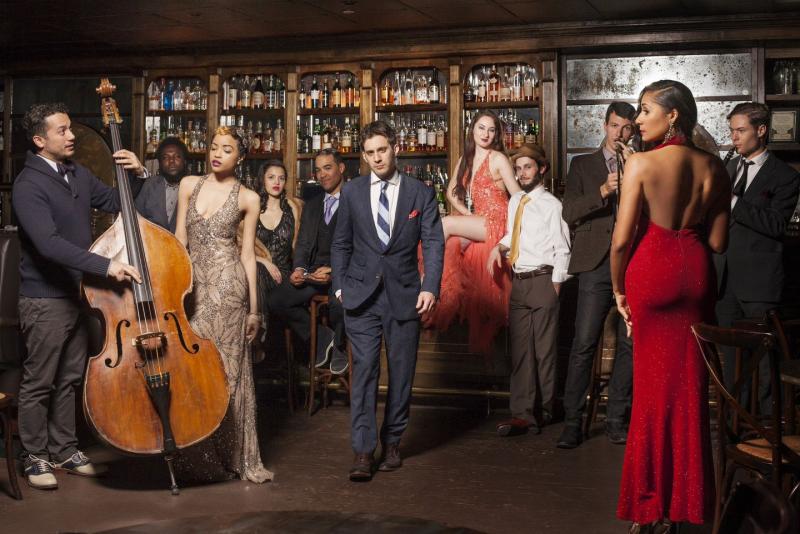
DP - "Can you recall an example of learning something new from what someone came up with?"
SB - "Oh sure, yeah. There's been lots of times when I've worked with somebody I knew that were great at coming up with background vocals for instance, certainly when we've worked with Shoshana Bean or Mykal Kilgore. They create a lot of back up vocals with some cool harmonies, and they enjoy doing it. So it is a win-win right there. You get someone doing great work, and they can come up with something really creative and fresh as well. We took the Justin Bieber song "Sorry", played around with it, and got some ideas. One was making it sound like the old Motown song "Heatwave", and Shoshana loved it. I gave her my demo and she came up with these great background vocals that made the arrangement come to life differently than what I had intended. When this happens it's fun and elevates the whole production. The resulting work is something that feels fresh for everybody. That goes with everything. There is flexibility in all of the arrangements for people to put their own spin on certain things. Whether it is a vocalist or instrumental solo. As a producer and arranger, my goal is finding what parts should be prearranged and what parts are free for improvisation or creation. It's a give and take to finding ways to guide those collaborations. Often times it's more about finding out where the vocalist is coming from. Especially if someone is super experienced."
DP - "In the book you describe how as a kid you would take apart your toys to see how they worked, and then put them back together."
SB - "That's a common thing for creative people I think. It's never enough to color in the lines."
DP - "What was it like to discover a love for Jazz at a young age? "
SB - "It was a really eye opening experience. I became uninterested my piano lessons. I didn't love classical music too much music at the time. I was stifled by it. I felt like there was no way to be creative, like I was playing the standard repertoire that everyone else was playing. Discovering jazz changed everything. Jazz is about self-expression. Jazz is about creating in the moment. I love the idea of just playing something and not knowing where it was going to go, where I was going to take it. Certainly learning to improvise in the jazz tradition was a huge undertaking, and such a rewarding one. I began figuring out how to make certain sounds. If I did this, then this sound would be the result. This was a similar approach to me taking apart toys. I was never able to put the toys back together the way it was and sometimes they stopped functioning all together. With Jazz I was learning how to pick apart different parts of a song and see what happens when I put this sound with that sound. That kind of process made me interested in the mechanics in all genres of music, not just jazz. Whether it was doo-wop, funk or swing. I enjoyed seeing how each of these genres differed, what were their building blocks, and how to create by using and mixing those different blocks together."
DP - "You mention the impact you had in hearing Gershwin's "Rhapsody in Blue" for the first time as a kid. That is an energizing piece of music. Even if you are not a classical music person, as soon as you hear it, you want to listen to the whole piece. You speak on how excited you were getting that sheet music, so you could dive right into learning the exciting parts of the song. When you are arranging your music, do you start writing the exciting parts first? Do you just go right to the center of the tootsie pop?"
SB - "Yeah, it is certainly similar in a way. When I'm starting an arrangement, and trying to figure out what genre to put a song into. I'm looking for contrast. I'm looking for the most interesting way to rearrange a song. Certainly a lot of time I will just start off with the chorus. I may start with a groove. Maybe there is something in the original bass line that may remind me of something that I can turn into a different genre. I spend a lot of time looking at the lyrics to be honest. That's where I get a lot of my ideas. If this song were written in another time what kind of song would it be? Certainly with 'My Heart Will Go On" everybody knows the original version by Celine Dion. If you take it away from the production, you take it away from Celine Dion's vocals, and you look at just the lyrics, it's a very sentimental song. It's a little over the top really. I thought of the 1950's. That's the kinds of ballads they wrote back then for singers like Jackie Wilson. With songs like 'Sweet Child of Mine", the lyrics are like those you'll find in an old blues song. Why not interpret it that way? When we are at our best and things fall into place and clicks, it's a result of having these lyrics from the 2000's somehow also work if it was interpreted many years ago. When you hear the Postmodern Jukebox version you have to think for a second and ask, "Wait a minute. Was this actually and old song or is it Kanye West song with a chorus from the 60's?"
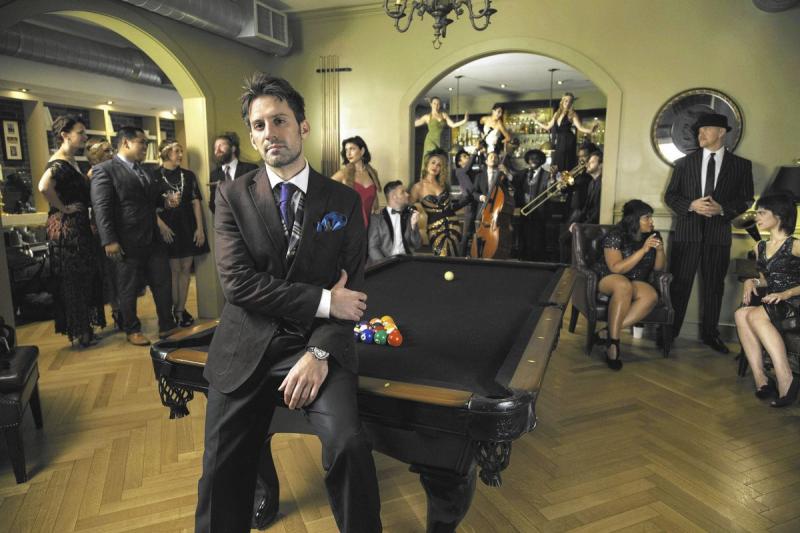
DP - "I've noticed when playing your music, sometimes people get confused and ask, "Was that originally a Jackie Wilson song?"
SB- (Laughs) "Or you get the complete opposite. The original of song will come on and we have some fans that tell us that they know our version of a song more so than the original. They think, "Wow, someone re-mixed Postmodern Jukebox." Nope! (Laughs) We didn't write it."
DP - "While developing Postmodern Jukebox, what steps did you take to make sure it took off as an original art form and didn't dive into the pool of becoming parody?"
SB - "That's a really good question. That was something I was focused on even before PMJ. During the early days, the precursor to PMJ was group called A Motown Tribute to Nickleback. That was PMJ before it became PMJ in my world. I was pretty adamant on that project that we were going to take it seriously. Even though we knew there was a layer of irony obviously in what we were doing. We knew people would respond saying, "What is that? That sounds ridiculous." We didn't want to do it with a wink and a nod, and make it like we were making fun and goofing on Nickleback. Because that's not of interest to me as is actually raising questions, and as a result when people listen to the MTTNB, they really like it. They actually ask themselves these great rhetorical questions. "I like this version. Does that mean I like Nickleback or does it mean that I like this song? Does it mean that I like Nickleback when its not performed by Nickleback?" You take a great song and transform it into different genres so it still has meaning. It makes you think about it more than if it was a parody, or a silly, funny version of the song."
DP - "What are your thoughts on like comparisons to parody artists like Weird Al?"
SB- "He's definitely got a great conceptual parodies of songs and that's his thing. For us, we are not really changing the lyrics or the core DNA of a song. We are just changing the context it's placed in historically. Often it brings out certain qualities of the song; highlighting different parts that were not in the original version."
DP - "You speak in great detail in the book about the specific kinds of hater micro-organisms found swimming in the aquarium of the YouTube comment section."
SB - (Laughs) "Yeah its madness really."
DP - "Do you think it is possible to learn to love the haters?"
SB - "You know I definitely think it is. I don't know if everybody can. There are some people who are better off not reading comments at all. It will be healthier. Certainly some have a hard enough time with criticism or maybe insecurity issues. The last thing you need is a bunch of random people saying stupid things. This is really more a reflection of their own inner feelings instead of how they feel about your own work. For some it is possible to develop a thicker skin. You know a lot of times the fear of criticism is actually worse that the actual criticism. Once you are able to get it, you are able to just move on. Honestly it doesn't change the fact that having haters is a good thing."
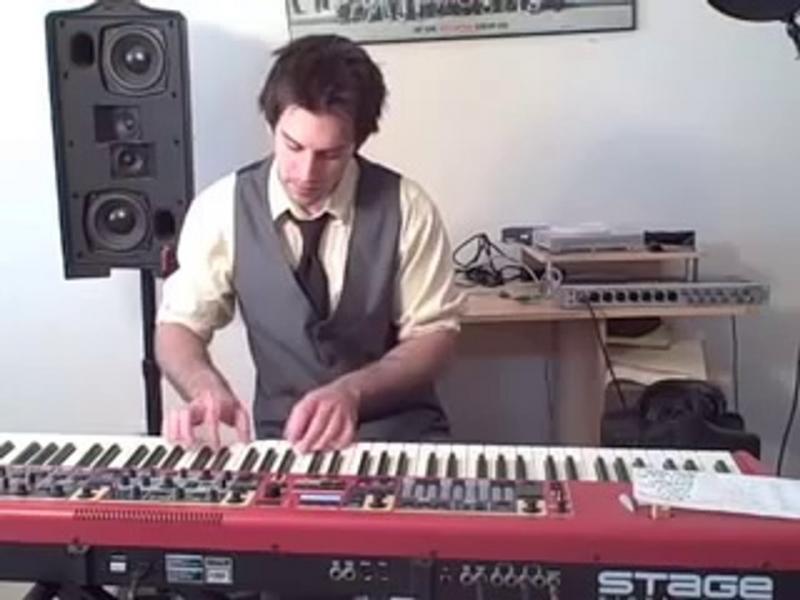
DP - "Why do you say that?"
SB - "It means people are engaged. There are people out there who really care. It's a symptom of success in some ways. If you were striking a nerve, if your work was not good at all, you would not even get to the point where there are haters. You would not get that far. People tend to ignore things that are of no relevance. I think it's important for an artist to not be afraid and not try to make everyone happy all of the time.
DP - "That's true. Perfection is an impossible goal to shoot for."
SB - "You can't do it. It's tough. Artists and performers are people pleasers in some ways. They want to make people happy. They want to have acceptance, to have validation. Those things can be harmful to someone's mentality because you are going to get criticism; fair and unfair. People are going to write crazy things about you. That's what people do on the Internet. (Laughs) You always have to remember that you are watching the absolute worst in human nature. In reading these comments, you are seeing people react with no social cues whatsoever. They are talking to a computer monitor, not a real person. They type out horrible things that they would never say directly to someone's face. Behind the anonymity of the Internet, people feel embolden to basically vomit negative emotions at people. (Laughs) It's weird, but you can't even think of them as real people that are saying those horrible things. Because its not a real person talking to you. It's just a terrible part of their human psyche."
DP - "PMJ has incredible amounts of diversity in its musicians, singers and dancers. How important and influential is diversity to you?"
SB - "If you look back at the history of music. It has been a very diverse discipline in general. When you are doing a project like this, we are not doing just one genre; we are doing lots of genres to capture this industry of early popular music. Certainly there is much essential diversity in that. If I am building a project, tour, or video, I want all these different disciplines to be represented. Diversity makes life more interesting. If its' just the same four people covering songs, that does not seem as interesting to me compared to bringing people together from all over with very different experiences and styles. That's exciting and it's cool to see people coming from different places and putting their own spin on the concepts. We have had a cross of every race, age, and even a seven foot tall clown." (Laughs)
DP - (Laughs) "The freedom and essence of PMJ is very bohemian. There's musical gypsy element to your collection of different performers coming together. Not to get too political, but that in itself is the beautiful example of the melting pot of the arts."
SB - "You know, as time goes on you start to realize more and more that this concept is not about one people. It doesn't have to be. There's no reason why this only has to be about American music. We work with artists from other countries. We're hoping to do more to expand and grow. We have been to six continents. It's been crazy. We've seen how our music is enjoyed by every culture, every country that we've been to. Great authentic music is universal. It's a beautiful thing that I think is something that we need more of in this world."
DP - You say in the book, "The best time to record is right now. It's not important how perfect or what you put out there is. What is important is getting it out there." Is making art urgently difficult to manage?
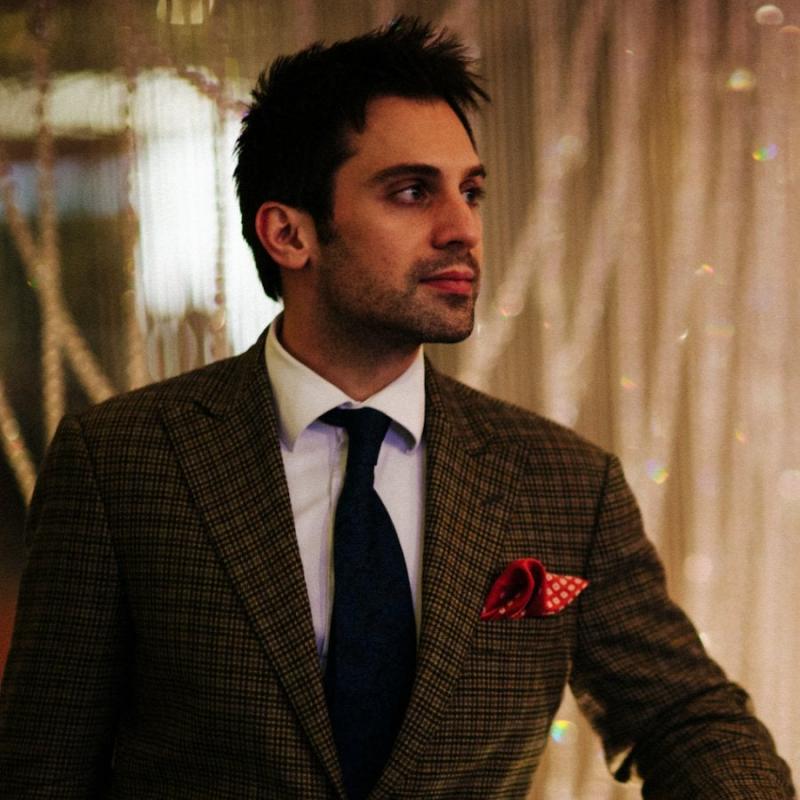
SB - That mindset has definitely been a very personal struggle. I was such a perfectionist when started. I was afraid to put anything out for essentially a decade. It's easy to say, "All of this project will be ready next month." Then that month turns into two, than a year, then five years, and then you realize you have nothing creative to show for a whole decade of your life. That's essentially what happened to me. I learned to reframe the way to think about creating. It is the journey of being an artist that is the work itself. It's not just a single song. It's all my years of toiling that have accumulated into this one moment. The approach that you will write this one perfect song or album is not real. Your work as an artist is the whole journey. That includes the early stuff that was maybe a failure of sorts. Maybe its something that kind of worked kind of but it wasn't your favorite, or something that everybody else liked but you didn't. These are all parts of the journey. And people want to see that stuff. You have no reason to be ashamed of something you created. Even if it was an earlier work that is not a representation of what you're doing now. Great artists change their styles all the time, and if you talk to them, many do not like their older stuff. It's just the way artists are. It can be really unhealthy for artists to start thinking in very idealized terms in comparing themselves to others. Especially comparing your work to the best work of their idols. Not every song Bob Dylan wrote was a big hit, or that he could've written those big hits without writing some that were not. It's all part of your journey."
DP - "There is a hilarious section the book about your early days of not making a lot of money for gigs so you had to pay the band with falafel lunches. The big question is what makes or breaks a good falafel?"
SB - (Laughs) "Wow. That is a very difficult question. What I like about falafel especially is that it's really hard to mess it up. I can't remember when I ever had a bad falafel sandwich. I've had all kinds from lots of different places. It's always been consistent across the board. At times something can be over cooked very easily, or not cooked to your liking. But falafel is very consistent. I think that whenever I have paid people with falafel, they have always gotten their falafels worth."
DP - "When you get caught in a situation where you are questioning yourself, how do you fight against that voice of doubt and negativity?"
SB - "Once I got past the early days of the initial battles, it became easier. I looked at how I had 500 subscribers. Then it grew to 10,000 subscribers. Then it grew more. If I don't put things out there, I am not being myself or being authentic, and Ill disappoint them. They specially follow me for my ideas and my vision. Then it grew as a sense of urgency. I realized I could not afford to be a perfectionist because I'd be letting them down. It felt worse to me in my mind to let people down that follow me than to put out something that I am not 100% sure of, or doubt myself. That was how I got through it. It's really helpful for artists to have deadlines and someone to hold them accountable. For instance if somebody asks "Would you like to be in our show and open for us? It's two months away." Just say yes and trust that you'll figure it out. You're not going to bail out if its something that is a really good opportunity. You find a way to get it done and if you have trouble with it then hire someone to help you. Get a tour manager that can help, someone who can help you focus and get those things done. I think saying yes to opportunities trains you to step outside of your comfort zone and that's really important as an artist. I say get in situations where you are not 100% in control and there is randomness in what you are dealing with. Those experiences force you to figure things out."
DP - "Now that the book is completed. What are you most proud of in putting your book out into the world?"
SB - "First that I was able to do it at all. That's was something where I started I thought it be really cool to start writing little stories from my life and not have a big picture. I didn't have any plans for the book; I didn't know what the book was going to be, I didn't know if it was going to be self-help, memoir, or a combination of both. I just started writing. I think that's the best way to do it. Afterwards you can always edit things down to fit what narrative needs to happen. I am proud of the content. I think the book does a good job of not just telling my story but telling it in a way that is fun and also can help people, artists, and entrepreneurs. It strikes a balance between something that is easy to read. Like you said I have talked to so many people who have sat down to read the book and they kept reading it until the end. Its one of those reads that people can move through very fast. I am thankful for that. That's a dream right there man. Creating something that people can pick up and not want to put down."
.jpg)
DP - "The book has a wonderful openness to it, as if you are listening to an old friend talk about the old days. Was it easy for you to reflect on your life so far?"
SB - It was very important for me to be really candid and honest about failures.
I wanted to be helpful, authentic, and honest. Give the reader real talk. If you are going to make a career in music or the arts, or any part of the entertainment business, you need to know that these are all very difficult roads. It's challenging. You are not going to do everything right, you'll have failures along the way, and you'll have to figure it out. If you're going in with a mindset saying "Oh I'm just going to follow this advice and everything will be 100% fine." You are going to be demoralized and that's what makes people quit projects.
DP - "How have you discerned good advice from bad?"
SB - I think it's very important now for artists to especially be savvy in understanding how this industry works. Certainly in the music business you can be independent and still do very well. You don't need a record label; you don't need to do those things anymore. This approach is crossing over. You can already see how comedians, and actors are building YouTube presences to be able to bypass the audition process that used to be the old fashioned way of doing things in the industry. All these things are changing, and I want to give a modern day example of this story where there is no record label, no reality TV. It was just me in my basement with a bunch of talented friends."
(Bradlee shares in a passage a compelling story of as a kid he found much inspiration from his poster of the famous photograph called "A Great Day in Harlem" by Art Kane. It was taken in 1958 in front of a Brownstone at 17 East 126th Street, between Fifth and Madison Avenue in New York City. What made this iconic image so important is that it was an unprecedented gathering of nearly sixty jazz legends all standing together in one spot. Count Basie, Dizzy Gelespie, Sonny Rollins, Theloniouis Monk, and Mary Lou Williams just to name a few. )
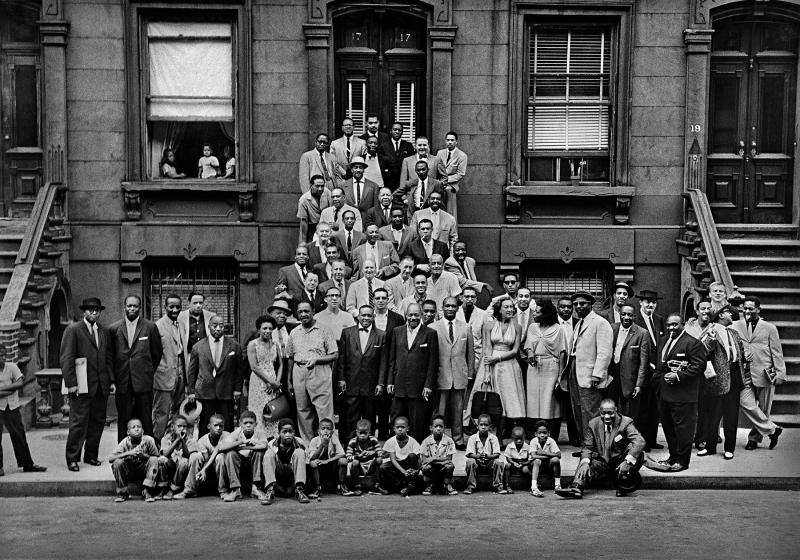
DP - "In the book you share a more recent event of back to your childhood home and cleaning out the closet of your old bedroom, and you found the poster of "A Great Day in Harlem" that hung on your wall for years as a kid. What is it about that picture that inspired you greatly then?
SB - It's an unbelievable photograph capturing an extremely special moment. Just the fact they were able to get everyone together is amazing. I know what it is like to do a photo shoot. We have tried to set up time to get a band of eight people together in the same day. (Laughs) it was ridiculous and nearly impossible to do. To get that many musicians that were not just jazz musicians but legends. These were people that dedicated their whole lives to this craft. Everyone was there. Each face there tells a story. Each person contributed to this beautiful art form. A book could be written about any one of the people in the photograph. I was an all-inspiring thing to get to see something like that. It makes you feel like this is something I want to dedicate my life to. Do something that feels significant. That picture has always been a reminder to me. Like a lighthouse in way; something that reminds me to stay focused on what my dreams and passion were, and to figure out how to make it happen. The thing is sometimes when you give yourself a way out. If you go into something thinking "Well I really want to be X,Y,and Z but its fine if I'm not. I'll just do this instead." That means that in some way when you are tested, the odds are pretty good that you are just going to abandon the original plan for your dream, and go for something easier. This is a reminder to me that whenever those opportunities happen when I am tested, I think to what any one of these jazz musicians would have done. They didn't care about what society wanted them to do; they cared about following their own vision. That is something that was very inspiring to me."
DP - "What really struck me after reading your affinity for that photograph from such a young age was the ironic comparison I found to your career today. I had previous seen "A Great Day in Harlem" in the past but was ignorant to its cultural significance and legendary subjects. I did not know they were all foremost pioneers and legendary jazz musicians. Looking at that photograph you idolized as a child and comparing it to a recent press photo of Postmodern Jukebox I found an amazing and moving similarity of a gathering of passionate musicians. You have collected dynamic artists to make Postmodern Jukebox from all over the world, building an amazing performing creative outlet and expression. Like in the photo, PMJ is a gathering a wonderful collection of artists with passion. It really is amazingly rare and wonderful thing to go from being a kid with that poster up on your wall, and now here it is 2020 and that kind of collective is what you have built over the years."
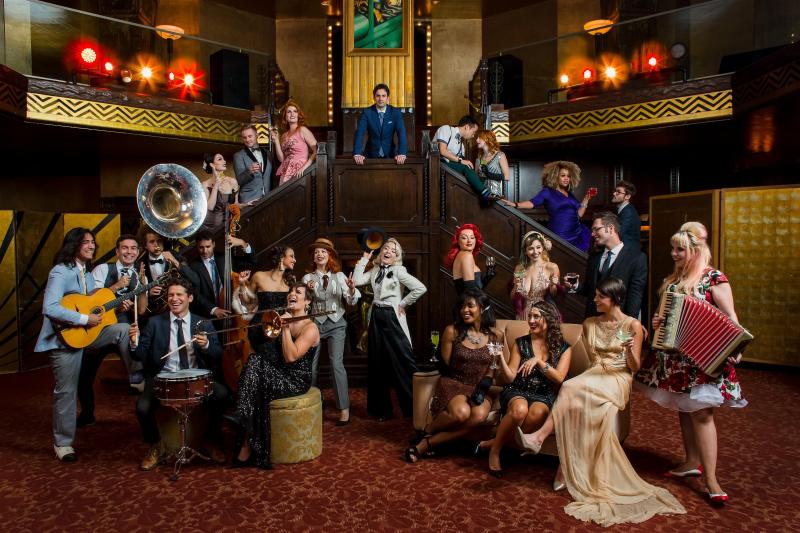
SB - "Thank you. Wow. You know I didn't even think too much about that. You're absolutely right. For us it's been always been about playing with a bunch of musical freaks and weirdo's who are super talented; the people that don't fit into any of the boxes. We are all somebody that isn't quite theater or someone who is not quite jazz. These are all amazing performers who each exist with their craft that the industry just can't serve. They are so amazing and they need a platform to be heard because they are tremendous artists. It feels great to be able to tend to any of those voices out there. So thank you for that."
After this lengthy conversation we ended the call with good will and kudos. Scott Bradlee's story is one that will inspire, enlighten and entertain. If you are in any way creative, this book provides Bradlee's inviting candid insight on his journey and how making dreams a reality is possible. Scott Bradlee's creative heart makes sure The Postmodern Jukebox is always plugged in and Ready to Play.
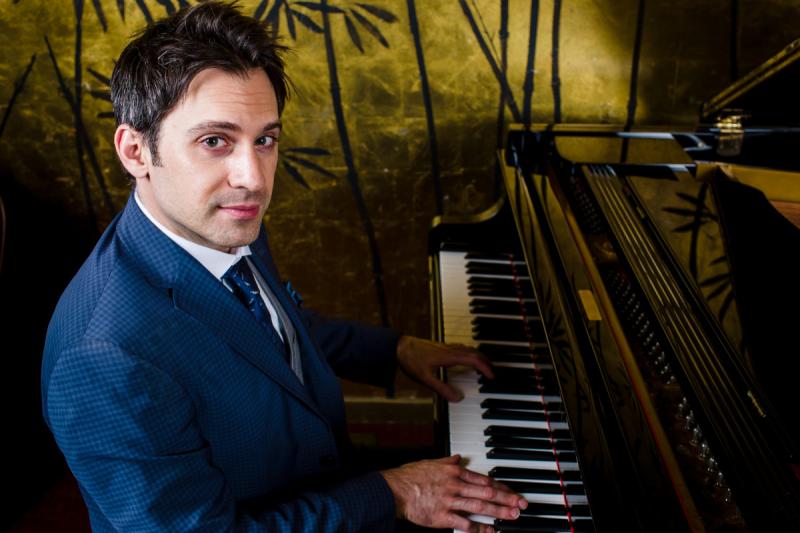
You can purchase Scott Bradlee's book - "Outside the Jukebox: How I Turned My Vintage Music Obsession into My Dream Gig" and get tour dates, band bios, purchase albums, and find links to all his social medias at https://postmodernjukebox.com/home/
Comments

Videos
